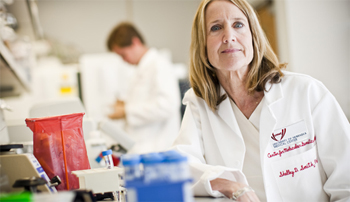An Iowa high school science lesson on DNA replication had a lasting impact on Shelley Smith, Ph.D.
“It was the coolest thing,” she said of the lesson that sparked her career in genetics.
Today, the director of developmental neuroscience at UNMC’s Munroe-Meyer Institute, studies the relationship between genetics and learning disabilities, including dyslexia.
 |
Shelley Smith, Ph.D. |
Major finding
A few years ago, Dr. Smith and her collaborators discovered a link between a particular gene and language impairment. The finding, which has since been replicated by others, shows it can affect both reading and language.
“It had been thought that reading disability, language impairment and speech disorder were entirely separate conditions, and they are usually diagnosed separately and treated separately,” Dr. Smith said. “The finding confirms that there are common factors. It also helps explain why some kids have problems in more than one area.”
Suggestion leads to career
Dr. Smith’s research into dyslexia began in graduate school when her mentor suggested a thesis project involving a Swedish family with significant dyslexia.
“It looked like a dominant trait and in those days those were the types of traits you could find genes for,” she said. “We naively went into this thinking we could find these dominant families and the gene localization would be easy. We actually did find some families and they serendipitously led us to the right place.”
They published a linkage in 1983, but also realized that the inheritance of dyslexia was more complex than a simple dominant trait. It wasn’t until technology advanced were they able to discover the more-difficult-to-find quantitative trait genes.
Technology leads to breakthrough
As technology advanced, so did her research. In the mid-90s, better DNA markers further propelled her work and her group made its finding regarding the language impairment gene.
Today, Dr. Smith also oversees a $10.4 million Center of Biomedical Research Excellence grant that provides research opportunities as well as career-development and mentoring for junior faculty. She also co-directs the M.D./Ph.D. program, which has grown to 26 students.
“I think of science as being really elegant,” she said. “There’s a constant challenge of wanting to see how it works because the answers are lovely.”
Thanks for such a lovely article. It's neat to hear how one person/lesson can have such a profound impact.
Dear Shelley
This is well deserved and I sincerely congratulate you and happy for you. Warm regards, Sasha